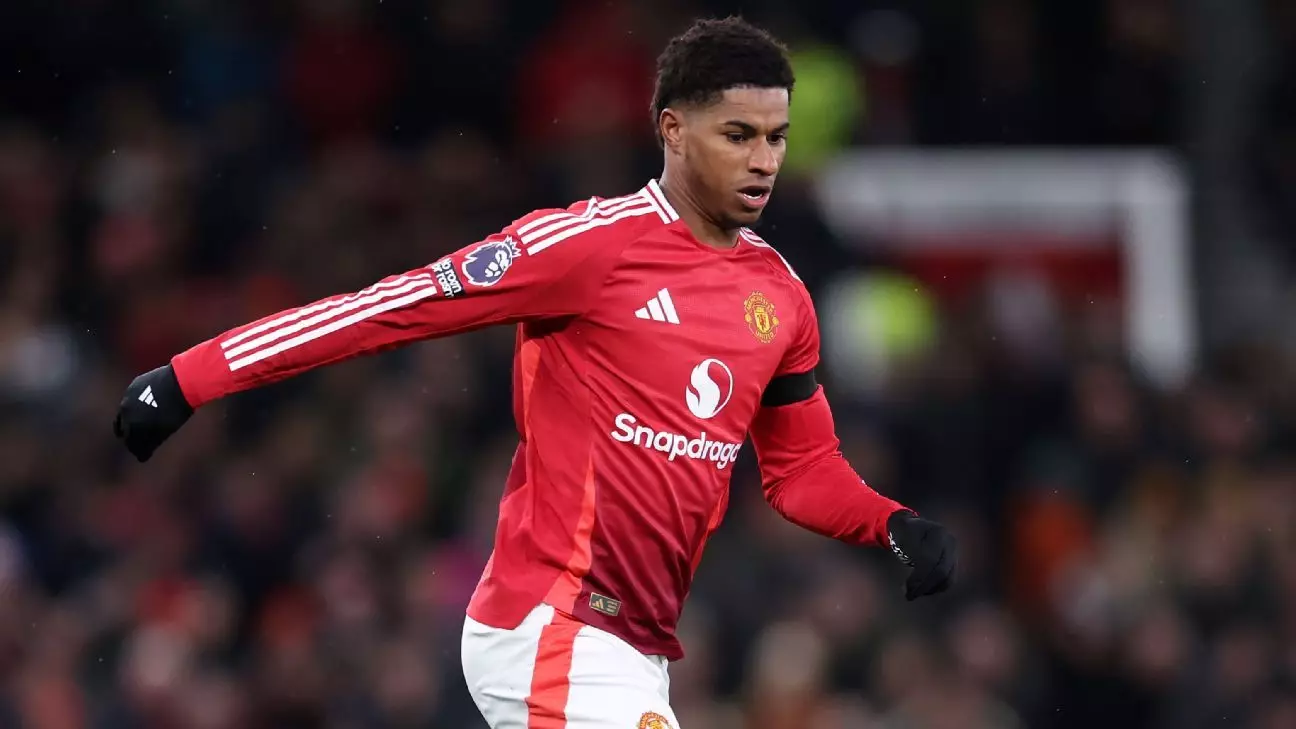The landscape at Manchester United is shifting, presenting a mix of both discontent and potential opportunity for one of its once-celebrated stars, Marcus Rashford. The 27-year-old forward recently expressed feelings of disappointment after being left out of the squad for a critical derby match against Manchester City, a situation he found “disheartening.” This public admission wasn’t merely an emotional outpouring but perhaps an indication that Rashford is contemplating a significant transition in his career—either on the pitch or beyond.
The reasons behind Rashford’s omission from critical matches highlight underlying issues that permeate the club’s environment. The new manager, Ruben Amorim, cited comprehensive evaluations—ranging from training performance to interpersonal dynamics—as factors determining squad selections. Such scrutiny reveals a deeper problem: Rashford’s once-elevated status within the team seems to be diminishing. Recent criticisms from fans and the managerial shifts have prompted Rashford to reevaluate not only his role at United but also his aspirations as a player.
Ruben Amorim’s ascension to the managerial role comes with its set of challenges, especially in managing a team with fluctuating morale and confidence. Despite being viewed as a fresh start after Erik ten Hag’s reign, Amorim’s leadership style calls for stringent accountability from players. Rashford, who had previously been benched for missing meetings and training, seemingly finds himself at a crossroads. His earlier relationship with the club exemplifies the complexity of player-management dynamics in professional football, where personal and professional expectations often clash.
The pressure that comes with a hefty £325,000-per-week contract further complicates Rashford’s situation. With financial stakes high for both the player and the club, the possibilities of a transfer loom larger than storytelling in the press. Such speculation raises pertinent questions about loyalty, worth, and the road ahead for a player who has avidly represented Manchester United since his debut nearly nine years ago.
Reflections on Performance and Identity
What stands out in Rashford’s recent comments is a sense of maturity and self-awareness. He articulates a recognition of his misunderstood status among supporters while reflecting on his personal journey through the complexities of the game. It’s a narrative of evolution: the young boy who once idolized the club has now grown into a player grappling with expectations, disappointments, and the elusive pursuit of success.
Rashford’s perception of being “misunderstood” adds a layer of complexity to his character; it speaks not only to the struggles he faces on the field but also to the public’s often unyielding scrutiny. His assertion that he has no regrets is perhaps the most revealing aspect of his reflection. Living in the present and accepting past experiences, whether positive or negative, emphasizes his resilience. He recognizes that ambition is an ongoing cycle, with each achieved goal merely a stepping stone to the next.
As Rashford navigates this critical juncture in his career, speculation about his future will undoubtedly become increasingly rampant. While there appears to be no pressing interest from European clubs, the growing allure of alternative leagues, such as the Saudi Pro League, may offer a different path. For a player of Rashford’s caliber, the choice to leave Manchester United—where he has invested nearly a decade of his career—will require considerable contemplation.
Rashford’s upcoming involvement in the Carabao Cup quarterfinal against Tottenham Hotspur could prove pivotal. How he performs in high-stakes matches might influence not only his standing at United but also the outlook on potential transfers. Regardless of future decisions, the sentiment he shared about his readiness for a new challenge resonates deeply. It suggests a drive to confront new obstacles, whether within Manchester United or elsewhere.
Marcus Rashford embodies the dichotomy of modern football: talent intertwined with personal challenges. His journey emphasizes more than just athletic prowess; it lays bare the vulnerabilities and aspirations of a professional athlete. Whether he chooses to stay and strive for redemption at Manchester United or venture into the unknown, his next moves will undoubtedly be watched with keen interest, both by supporters and critics alike.

Leave a Reply